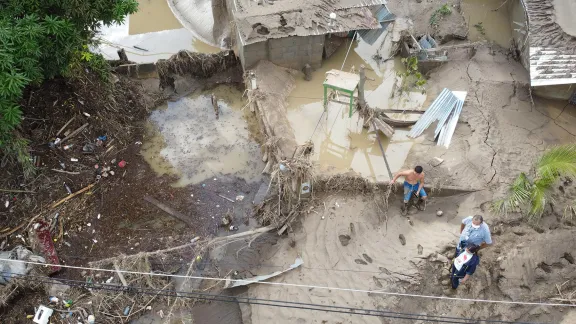
LWF Honduras representative Carlos Rivera (with white face mask) visits Chamelecón, Honduras, to see the damage done by hurricanes Eta and Iota. As the flooding came unexpectedly fast, many people lost all their belongings. Photo: Sean Hawkey
LWF and partners launch call for accelerated climate adaptation
(LWI) - Joining UN bodies and international humanitarian organizations, The Lutheran World Federation (LWF) is calling for accelerated climate adaptation to mitigate and prevent risks for disaster that disproportionately affect the most vulnerable. The call will be issued with a video during the Climate Adaptation Summit (CAS) 2021 taking place online on 25 and 26 January.
The video outlines the effects of climate-induced disasters and shows how they can be managed and reduced.
Humanitarian impact of climate-induced events
In the past ten years, the call states, climate- and weather-related disasters have claimed more than 400,000 lives, affected 1.7 billion people, and displaced an average of 25 million people annually. These risks are rising with more frequent and more extreme events predicted for the future. By 2050, 200 million people could need humanitarian aid every year because of climate-related disasters.
Although the climate crisis hits everyone, the most vulnerable people are disproportionately affected. They face multiple other threats, including conflict, violence, and poverty. According to the ND-Gain index, of the 20 countries considered the most vulnerable to climate change, 12 are affected by conflict. Many displaced people live in climate hotspots where they are regularly exposed to severe flooding, heat waves, and drought.
Marginalized groups, including women, children, the poor, and food-insecure, are hit hardest. Women account for a high percentage of those displaced by climate change are women. Also, older people tend to be disproportionately affected by disasters.
Climate adaptation is key
However, climate- and weather-related disasters are not inevitable, the call states. There are tools to manage and reduce climate risks and adapt to them.
Using scientific data to prevent and act early and working together with local communities and partners, the impact of disasters can be limited.
Finances are required to install systems that trigger anticipatory action before extreme events strike. This can prevent them from becoming disasters and can preserve lives and livelihoods.
Global climate action must prioritize supporting the most vulnerable countries and communities to prevent, prepare for, and adapt to the ongoing climate crisis.
LWF’s engagement
“LWF actively works with its member churches and through its country programs to build resilience and adaptation capacity of vulnerable communities and in disaster risk management,” explains Isaiah Toroitich, LWF’s Head of Global Advocacy. “Climate protection and humanitarian efforts go hand in hand and therefore the international community must redouble its efforts towards ambitious adaptation and mitigation action.”
LWF actively works with its member churches and through its country programs to build resilience and adaptation capacity of vulnerable communities and in disaster risk management.
LWFs World Service program in Ethiopia is one example for LWF’s engagement in this regard. It is involved in agricultural development and water sustainability among local communities. It also supports tens of thousands of refugees with water and sanitation programs, education, psychosocial support, livelihood development, and environmental conservation.
Another example is Central America, one of the most vulnerable regions globally. Here, LWF World Service runs projects on environmental sustainability, local natural resources management, and food security in Guatemala, Honduras, and Nicaragua.
The call for action launched during the CAS 2021 takes up one of the action themes of the summit and was jointly produced by the LWF and Concern Worldwide, Inter-Agency Standing Committee (IASC), International Committee of the Red Cross (ICRC), International Federation of Red Cross and Red Crescent Societies (IFRC), Norwegian Refugee Council, United Nations Office for the Coordination of Humanitarian Affairs (OCHA), Save the Children, Special Rapporteur on the Human Rights of Internally Displaced Persons, United Nations Population Fund (UNFPA), United Nations High Commissioner for Refugees (UNHCR), and UN World Food Programme (WFP).
By LWF/A.Weyermüller


